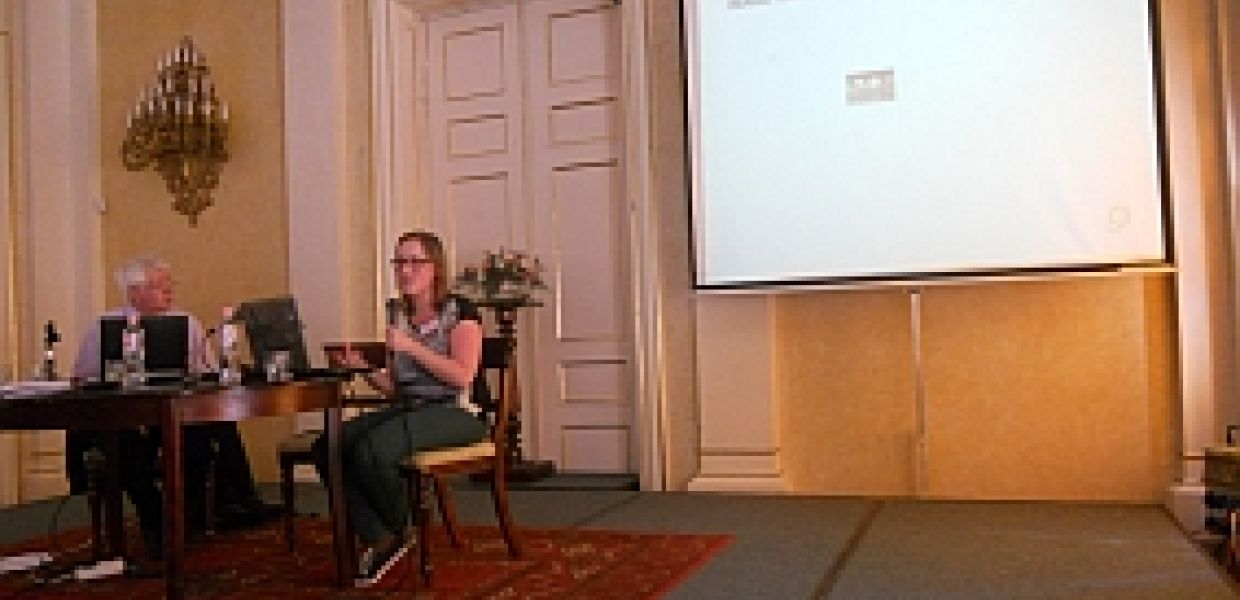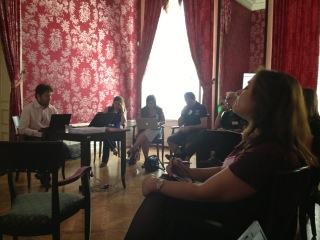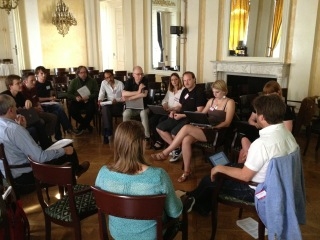Legal Barriers Workshop at Budapest Networking Event

Extracted from a blog by Jeanine Tieleman, Quality Manager, Digital Heritage Foundation, The Netherlands. View the full blog post on Europeana Inside.
On 12-13 June 2013, the Second Networking Conference of the Europeana Inside project took place in Budapest, Hungary. The meeting took place in the beautiful Petöfi Literary Museum, once home to Hungarian aristocratic families.
As part of the conference, a workshop for content providers looked at reducing legal barriers to participation in Europeana. Discussions focused on the Europeana Licensing Framework, Intellectual Property Rights issues and a report that analyses IP practices from the Europeana Inside project.

Dimitra Atsidis (Europeana) at the 2nd Network Meeting in Budapest, picture by SPK
The report by IPR consultants Naomi Korn and Professor Charles Oppenheim identified some of the key legal, licensing and policy challenges that are inhibiting organisations from contributing their previews and metadata to Europeana. It drew on responses to a questionnaire answered by 9 organisations. Despite the small basis for conclusions and recommendations, the barriers, constraints and recommendations mentioned in the report are generally recognised by organisations in the Europeana Inside consortium.
The workshop highlighted a discrepancy between one of the recommendations in the report, namely that more training of staff on IPR issues is required, and current practice - Europeana already puts quite a lot of effort into organising workshops on training in IPR all over Europe. It would be interesting to find out what causes this discrepancy.

Marco Streefkerk (DEN) at the 2nd Network Meeting in Budapest, picture by Jeanine Tieleman, DEN
On the subject of metadata, the main point of concern for organisations turned out to about controlling the (quality of the) metadata. Interesting in this respect is the discovery that the more organisations are forced to open up their data at one level, the more they are inclined to tighten their grip on their data at another level.
The workshop ended with discussions about lobbying by the cultural sector at the EU. While there is fierce lobbying in Brussels by adversary parties such as right holders, publishers etc. for their interests, the cultural sector remains silent on this issue. Consequently, the interests of the cultural sector are not (well) represented and therefore in general not known in Brussels.

The network at work, picture by Jeanine Tieleman, DEN
The cultural sector has to adapt to the new realities, which nowadays means not only concentrating on the management of beautiful collections, but also, being able to defend the interests of the sector on different levels - nationally as well as on a European level. Building strong networks for representation and lobbying will strengthen the position of cultural heritage institution.
The purpose of having this IPR research as part of the Europeana Inside project is not only to end up with a list of IPR-related problems, but also, within the Europeana Inside project, to try to follow up the recommendations as much as possible. Therefore the next goal on the agenda is to compile a European checklist on IPR for institutions wishing to participate in Europeana. In order to involve the knowledge and concerns of as many cultural heritage institutions as possible, a draft list will be developed and distributed among the Europeana Inside partners for feedback and discussion.
For more on the workshop and the discussions that took place, see the Europeana Inside blog.
